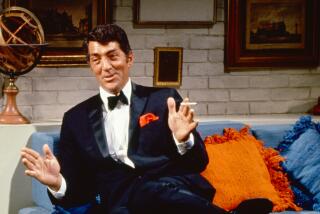Superman superseded
- Share via
Having first caught the public’s attention opposite Teri Hatcher in the TV program “Lois & Clark: The New Adventures of Superman,” Dean Cain would know when he says there is no such thing as “The Superman Curse.” Instead, he is grateful for his time in tights, although he does seem somewhat relieved that in the upcoming film adaptation of “Superman,” some other actor will tackle the role.
A single father to his 5-year-old son, Cain, 38, has nevertheless been busy. He had roles this season on “Hope & Faith” and “Las Vegas,” recently shot a pilot for another series, and is starring in the independent theatrical thriller “Lost.”
Though many people still identify you with the Clark Kent/Superman role, a heroic and likable character if ever there was one, over the last few years you’ve been playing a streak of nastier, meaner characters. When did you realize you had this side gig going at being such a jerk?
When I first started auditioning for roles, when I first came out, most of the roles were the jerk -- the football captain who beats up the nerd, those sorts of things. I got a part on “A Different World” where I played a racist from another school. These were the roles I was getting at first, so I’ve always known I could play those roles. But at the time, I felt, “That’s not me, I’m a nice guy.”
I suppose, as I’ve gotten older and matured, I’ve come to appreciate different roles as reflecting different facets of a personality. I understand those roles, bad guy roles, better than I once did. They’re dynamic roles.
In “Lost,” it seems at first that your character is just a run-of-the-mill traveling salesman type, with all the negative connotations that carries, and then through the course of the film it is revealed he’s even worse than that and is responsible for some pretty bad things.
The character, he starts off -- the best villains are the ones you don’t suspect. You don’t think he’s done anything wrong, and you’re rooting for him.
When I first read the script, I was rooting for him the whole way, and I didn’t like what he had done, but I wanted him to get away with it. When I finished the script, I threw it across the room and said, “There’s a script I’m not going to do.” I was just mad at it. Then I met with the producer and the writer-director, and by halfway through the meeting, I was sold.
An awful lot of the movie is just you driving around in the desert either talking to yourself or talking on a cellphone. Was it difficult pulling off those scenes? Just who fed you the lines on the other end of your phone?
There was a P.A. named Cher. She was a real trouper, because it was 115 degrees out, just horrible, and she’s stuffed in the back of a car giving me lines. Sometimes it wouldn’t come out right, the timing would be off or I wouldn’t hear or whatever, and I would jump all over her, and it worked.
When you’re trying to listen and act ticked off, and it’s really hot in that car and you can’t hear, it’s amazing what comes out of your mouth. On an independent film, there is a freedom and a trust, and you know it’s going to come together, so you don’t mind being a jerk.
Before you started acting, you were drafted to play professional football but suffered an injury during training camp and never got to play a single game. Did that experience give you any insights that helped you navigate the ups and downs of a career in Hollywood?
First of all, I had ideas about Hollywood to begin with because my father [Christopher Cain] is a film director. I watched a lot of my friends, people I grew up with, become successful, make mistakes. Charlie Sheen, Chris Penn, Sean Penn, Rob Lowe, Holly Robinson, I grew up with all those kids. My dad directed and produced “Young Guns” when I was in college.
I never planned on being in this industry until I was midway through college, and it appealed to me because it wasn’t 9-to-5. Little did I know the hours can be a lot longer than that the days you do work. So I realized early on what Hollywood was like. Being a pro ballplayer, having done something else, gave me a perspective to understand it’s not that important. There are other things out there. But it is a very fun way to make a living.
-- Mark Olsen

